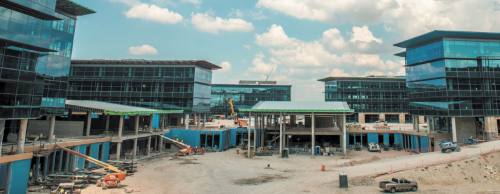As three headquarters and corporate offices prepare to open this year, Plano officials expect the projects to add nearly $1 billion to the city’s tax rolls and have a broader effect on the local economy.
The three projects—including headquarters for Toyota Motor North America and corporate offices for Liberty Mutual Insurance and JPMorgan Chase & Co.—are expected to open later this year and create a total of $925 million in new taxable value at their respective sites, according to city documents. This estimate does not include a broader economic ripple effect that is expected to include additional construction, product and service sales, travel, retail, hotel and dining activities.
“What’s hard to quantify is the multiplier effect,” Plano Mayor Harry LaRosiliere said. “So the person who now works here in Legacy West goes to lunch three times a week and spends their lunch money in Plano. … Statistically, they’re going to spend a good portion of their income within a radius of where they work. You really can’t track that.”
The city also expects these three companies to bring about 14,000 employees to the southwest corner of SH 121 and the Dallas North Tollway on a daily basis. Over the next three years, about 30,000 employees are expected to work in the corridor, including employees from FedEx Office and Print Services, which opened its headquarters in 2015, and retail and dining stores at Legacy West, a $3.2 billion mixed-use development, LaRosiliere said.
Sometime this summer, NTT Data is also expected to bring about 600 employees to the corridor with the move of its North American headquarters to One Legacy West, a 14-story office building.
Toyota has gained the most attention with its North America headquarters, a development whose “scale and scope” prompted officials to hire an external consultant to evaluate the project’s broader ripple effect on the city’s economy, Plano’s Economic Development Director Sally Bane said in an email.
The study concluded Toyota would produce roughly $7.2 billion in economic output over the next 10 years. This total represents the value of production—such as sales or gross margin—and includes the company’s estimated ripple effect on the broader Plano economy.
Officials also consider Liberty Mutual and JPMorgan Chase to be important developments, but due to their smaller sizes and employment projections, the city did not commission broader economic studies as it did for Toyota, Bane said.
Incentives to build
The city of Plano’s economic incentives to these companies included nearly $17 million in grants and tens of millions more in tax exemptions over the next decade, assuming steady tax rates and appraisal values.
Toyota received a grant of approximately $6.7 million from the city. In return, the company is constructing a new 2.1-million-square-foot headquarters building and adding about 4,000 employees to Plano by the time the campus opens in mid-2017.
Liberty Mutual, which is expected to open in the fourth quarter of 2017, received a $5.2 million grant in return for constructing a 1-million-square-foot office building and adding more than 4,000 jobs by the end of 2020.
A $4.9 million grant was given to JPMorgan Chase, which will open in late 2017. To receive the grant, JPMorgan Chase is building a 1-million-square-foot campus and adding at least 4,800 jobs to Plano by the end of 2020.
The companies also received tax abatements, in which the company receives a 50 percent tax exemption for 10 years from the city of Plano in exchange for land improvements, according to city documents.
Plano’s broader pitch
LaRosiliere said the city’s selling point is more than the economic incentives it has to offer.
“Most companies have certain things that are important [to them], and it’s pretty consistent: safety, good schools, good infrastructure and mobility, and quality of life,” he said.
Companies relocating to Plano have also cited the benefits of consolidating their operations. The Toyota headquarters, for instance, were previously split between three corporate offices in California, Kentucky and New York.
“[The city of Plano] will continue to aggressively attract businesses that will add value to our community because that’s how we prosper,” LaRosiliere said. “By investing in our people [and] our community, we diversify our tenant base.”
This story is one update from The January Issue. View the full list of 6 things to look for in 2017 here.





